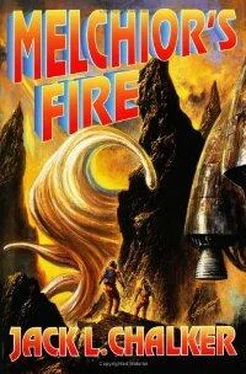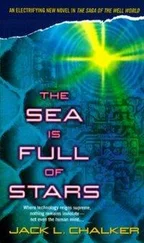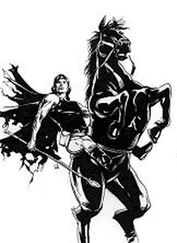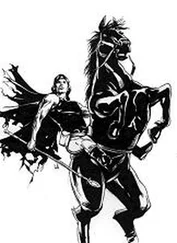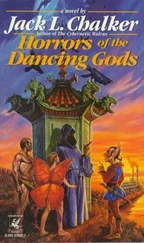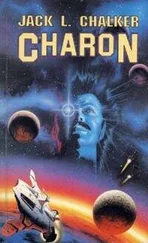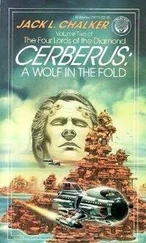“That’s been down there a while, You can smell it as a long-term derelict, an ancient shipwreck. Sure, you wonder if any of ’em survived, and, if so, did they manage to set up something permanent down there, but it’s a long shot. More telling is that it’s there at all, and that there’s good evidence it’s been buried by the sands and winds several times, and maybe baked and thawed as well on the sunward side. How many more might be down there, I wonder?”
“What? You think they were a colony or a military squadron or something?” Lucky Cross asked. “Don’t see that . Not out here.”
“No, no, I don’t mean that . I suspect they were scouts, explorers, maybe even some commercial vessel or a lone military one. I don’t mean how many other ships like that one might be down there someplace, hidden for now. Just the idea that we’ve seen the wreck of even one on the surface of the first world we looked at makes me wonder just how many ships from how many different races have come through here and not left. Remember how Li kept thinking of this region as some kind of trap? Maybe it is, either planned or just naturally one. Either way, it’s not a trap set for us, I don’t think. If the former, it’s set long ago for somebody or something very different than us; if the latter, it’s effective against just about anyone that comes here regardless of shape, size, or racial origins.”
“You want to go down there and have a look around?” Lucky Cross asked them.
“Not me,” Nagel replied, and, one by one, Sark, An Li, and most emphatically Doctor Queson also shook their heads “No.” With that weather and those caverns, their experience with the unexpected worm kept coming up as well.
“We could send Eyegor down,” An Li suggested. “That would solve a lot of problems at once.”
“Not a bad idea,” Nagel replied, only to see the hovering robot in the back area of the command and control center.
“I am not programmed to become an explorer,” it said, sounding no more enthused about going down there than the humans had.
“Ah, but what about your primary mission?” An Li pressed. “Look at the pictures down there! The first close-ups of the exterior and perhaps the interior of a truly advanced alien spacecraft. And who knows what else might be valuable?”
“Sand is not good for my workings, and I do not know if my mobility might be impaired. I believe the ship’s cameras will suffice for this one for now.”
“Then why are you really here?” Nagel put in. “If it’s not your job to get those kind of pictures, then the only conceivable mission you could really be on is to spy on us. That is what you’re really doing, isn’t it? Spying on us?”
“I am documenting you, not spying on you,” the robot responded. “If you go down there, I go down there. But without you, the potential for fulfilling my mission is greatly diminished.”
“Sounds fishy to me,” Sark growled. “I say we take it apart now, file it under spare parts, and forget about it. It can do us no good.”
The robot said nothing, but even the others weren’t sure whether or not Sark was joking and, worse, none of them cared if he wasn’t.
“We could send down a probe,” Cross suggested.
“Too limited,” Nagel responded. “It wouldn’t be able to do much if it could get inside the thing, and we’ve got a finite number. Best to use them when we have questions that have to be answered. This is just something we’d like to know, not something we can easily turn into money.”
After a long silence, An Li asked, matter of factly, “So, what do we do about poor little Kaspar here? Go down or go on?”
“We need stuff that can be picked up and hauled back and turned into money,” Lucky Cross pointed out. “I can’t see it down there with what we got. As you said, we couldn’t haul that thing back on a bet.”
“Any of the life that might exist down there, native or survivors and survivor descendants, will be underground at this point, or maybe underwater,” Queson pointed out. “This isn’t the right time to go looking for them, nor is there a lot of profit in it. I say we note this as potentially valuable but go on. I’ve had enough freezing cold and blowing sand.”
An Li nodded. “Anybody else? Then we’re agreed. Captain, launch your probe and survey satellite and let’s move on. We can always come back if nothing more promising turns up.”
“Very well,” the captain’s voice responded. “Let the log show we are in unanimous agreement. I think personally we should examine all three before doing much in the way of landing anyway. That goes even if the next one has streets paved with gold and the Fountain of Youth in the center.”
“I might stop on that,” Nagel commented. “Still, we all agree with the general sentiment.”
“Setting course for Balshazzar,” the captain told them. “At least it’s very pretty as worlds go. Were I still human, that would be the one that I think I’d go down and look over first anyway.”
“How long?” Nagel asked her.
“Two and a half days. We have to go slow and careful in this miniature solar system without charts and nav beacons. Planets this size don’t just accumulate moons and rings, they pick up a ton of junk.”
And now, from the bleakness of Limbo, they turned towards the spectre of Eden.
* * *
Even going the slow and careful route, though, they were well within instrument and sensitive optical range of the second livable moon long before they reached it.
“There’s altogether too much life on that moon,” Randi Queson grumbled. “Can’t pick anything valuable out of it. In fact, the only interesting parts are these energy signatures against some very small but measurably dead points. At least two could be the remains of routine solar-system lander power supplies, and a third could even be the remnants of an interstellar worm drive. There are several more such signatures elsewhere on the planet, but they don’t give off anything familiar or recognizable to the database. If we assume that at least one is ours, from some prior expedition, and maybe two, and we make the reasonable assumption that even a very alien civilization would probably wind up doing it for sheer practical reasons pretty much like we do, then we’re looking at the signatures of at least a dozen shipwrecks down there, at least a few of which are not ancient history. I keep thinking about Dr. Woodward and his evangelical space colony. We’re following in his footsteps and we got here with the same data, so why should we assume that he didn’t?”
“Yeah, but the old records say he had a humongous ship, a real artificial world moving through the universe,” An Linoted. “If that’s so, where is it?”
“It wasn’t cybernetic,” Queson pointed out. “And, as you say, it was huge . Put both of those in our wild hole and you might not be in any condition to get back once you get through, if you do. So let’s assume they did. Lucky, you’ve looked at the old records with the layouts of Woodward’s interstellar holy land. Am I off base here?”
“Nope, right on. In fact, Woodward was a physicist. He had to know, as did his pilots and crew, that it was gonna be damned near impossible to bring something that huge through, and, even if they did, to stabilize it in this environment when it emerged.”
“Faith,” the doctor responded. “Faith moves mountains. He would have no choice but to act on his faith, particularly if he thought God was directing them here.”
“Yeah, faith moves mountains. Faith Explosives, Queenspark, Marchellus,” Nagel said with a chuckle.
Читать дальше
